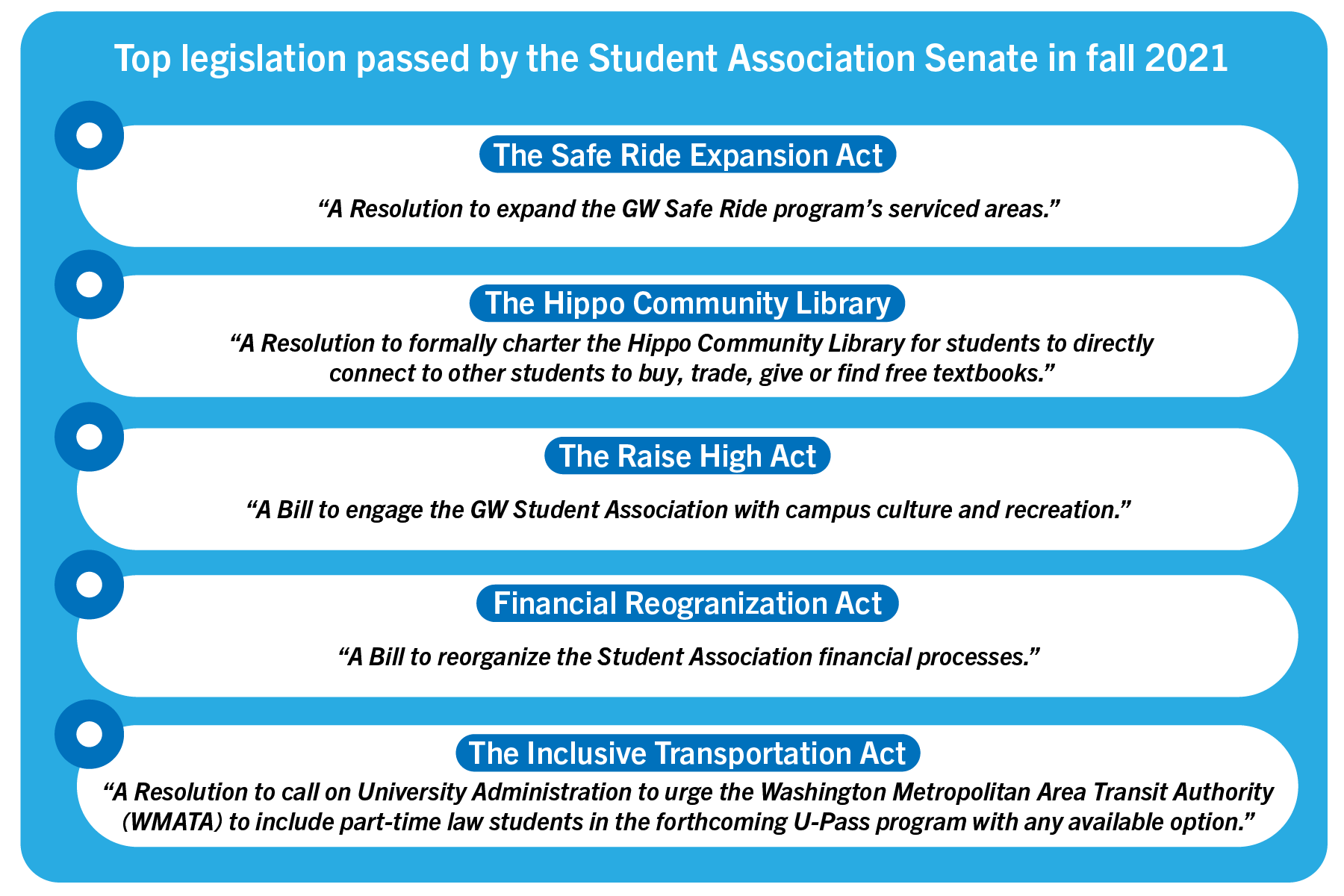The Student Association Senate passed more than 20 pieces of legislation since the start of its term in May, a slight downtick from the virtual fall 2020 semester.
Senators are tasked with allocating more than $1.5 million to student organizations each year, collaborating with officials to improve the student experience and holding senate meetings to pass legislation. During their 12 meetings since May, senators passed 23 pieces of legislation, with seven coming at the last meeting of the fall semester and two of them struck down by the Student Court.
The 23 pieces of passed legislation is a slight decline from the 26 approved the previous fall, according to the SA’s Legislation Tracker. Last semester was the senate’s third straight fall with more than 20 pieces of legislation passed after only voting in favor of four pieces in fall 2018, five in fall 2017 and 12 in fall 2016, according to the tracker.
In case you missed it, here’s what the SA Senate has worked on since the start of its term in May:
Election reform
Senators passed three special resolutions in September to each establish a fall referendum aimed at reforming SA elections – the First-Year Senators Amendment Act, the Proportional Representation Act and the Plurality-At-Large Voting Amendment Act. These special resolutions sparked a months-long debate between the executive branch and legislative branch resulting in a hearing before the Student Court over first-year senate seats and proportional representation between undergraduate and graduate students.
The fall referenda were set to ask students if the SA should hold elections for first-year senators each fall, if undergraduate and graduate constituencies should be divided in four additional schools and if plurality voting should determine outcomes in multi-seat elections, like senate races.

Nicholas Anastacio | Graphics Editor
SA President Brandon Hill openly opposed hosting fall referenda because he was concerned about low voter turnout failing to represent the entire student body. He vetoed the Fall Elections Act – a separate bill that would have codified the first-year senator and plurality referenda into the bylaws if approved by the student body.
The SA Office of the Legislator General filed a lawsuit against SA Sen. Chris Pino, CCAS-U and the sponsor of the first-year senators resolution, SA Sen. Cordelia Scales, SEAS-U and senate chairperson pro-tempore, and SA Vice President Kate Carpenter, alleging that first-year senate seats violated the SA’s Constitution and other founding documents. The Student Court struck down the planned first-year senator referendum after hearing oral arguments in October, ruling that the resolution was “inconsistent” with the SA Charter and the University’s Statement on Student Rights and Responsibilities.
The SA held referenda on proportional representation and plurality at-large voting in November, when about 66 percent of students voted to replace ranked-choice with a plurality system in multi-seat senate elections. About 86 percent of students voted to create separate undergraduate and graduate seats for the Milken Institute School of Public Health, the School of Nursing, the School of Medicine and Health Sciences and the College of Professional Studies.
Finance
The senate passed five pieces of legislation that shaped SA budget allocations to student organizations and its three branches and amended the financial bylaws. In May, the senate unanimously approved $431,000 in budget allocations for student organizations through October, marking a nearly 60 percent jump in funding compared to the $270,660 distributed in Fiscal Year 2021.
Senators passed a bill in September to reallocate more than $25,000 of the SA’s internal budget to the general fund for co-sponsorship funding that senators distribute to student organizations. The senate later approved more than $440,000 in general allocations to student organizations for the spring semester at a meeting in October, but the funding fell short of what student organizations requested after the University cut the SA’s budget by about $100,000 this fiscal year.
Senators also voted to revise the SA’s financial allocation process under the Financial Reorganization Act in December. Under the legislation, the executive and legislative branches must request remaining money from the SA’s general fund after graduate student umbrella organizations receive funding from the fund.
The branches together may receive either 5 percent or $40,000 – whichever is the highest total – from the fund, according to the legislation. The bill states that the judicial branch will receive $300, a decrease from the previous $500 that was allocated to the branch in previous years.
Student life
Senators approved legislation to boost academic resources, school spirit and transportation options as students returned to campus on the heels of more than a year of online education.
In August, senators unanimously approved a resolution that Carpenter sponsored to expand SafeRide, the University’s program offering students free late-night rides across Foggy Bottom, to off-campus locations. The following month, officials added stops at 2400 M Apartments, The Flats at Dupont Circle and the Lincoln Memorial.
Senators voted in September to create a textbook exchange program for students to buy and trade books through a Google Form, where they will be able to post their materials with course information and book prices in addition to links to PDF files for textbooks. Students said this program could alleviate textbook costs and make them more accessible to students facing financial difficulties.
The senate also passed the Raise High Act in October, a bill that amends SA bylaws to require senators to attend at least three GW-sponsored events, like sporting events and cultural celebrations, throughout the course of the academic year. The bill – along with the ‘Raise High’ Wednesdays initiative, a weekly campaign that encourages students to wear GW merchandise – is part of Carpenter’s goals to increase school spirit across various student organizations.
SA leaders also worked with officials to bring the Metro’s U-Pass Program to GW, providing unlimited Metro rides to undergraduate students at a rate of $100 per semester and with an option for graduate students to enroll in the program. Graduate senators in the SA sponsored the Inclusive Transportation Act resolution in December urging the University to ask the Washington Metropolitan Area Transit Authority to include part-time law students in the program.







